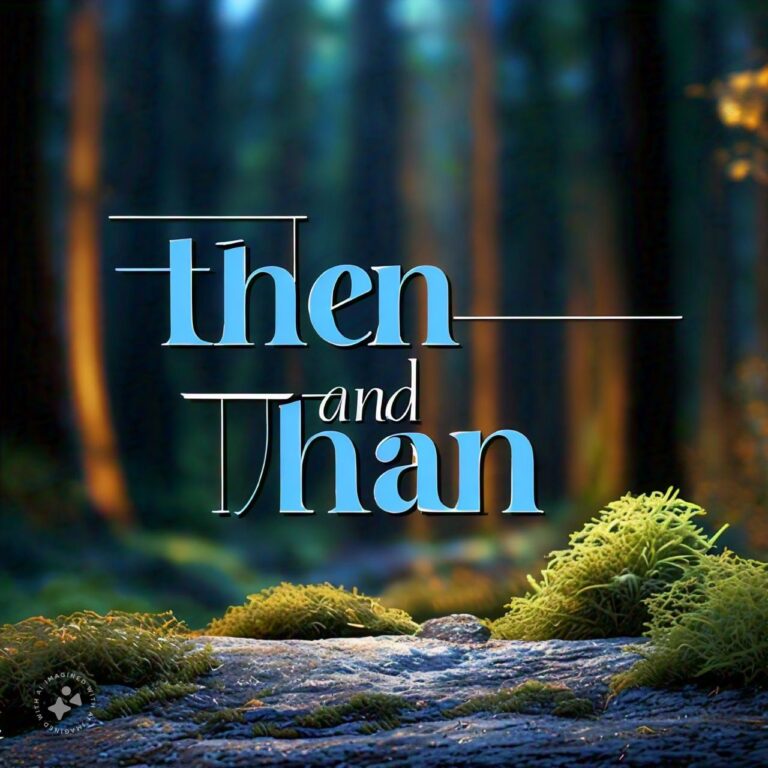
Differences Between Then and Than
“Then” and “than” are two commonly confused words in English because of their similar spellings and pronunciations. However, these words have entirely different meanings and functions in sentences.
“Then” is primarily used to denote time or to indicate a sequence of events, while “than” is used for comparisons between two things. Understanding the difference between these two terms is essential for clear communication in both spoken and written English.
Then Overview
Introduction to "Then"
"Then" is an adverb that has several uses in English, primarily relating to time, order, consequence, or condition. It is one of the most versatile adverbs in the English language and is commonly used to connect events in a logical or sequential manner.
Uses of "Then"
- As a Time Reference:
The most common use of "then" is to refer to a specific point in time, either in the past or future. It helps provide context about when something happened or will happen.- Example (Past): "I was in college then."
- Example (Future): "I'll finish my work, and then I'll go to the gym."
- To Indicate a Sequence of Events:
"Then" is often used to describe the order in which events occur. It connects actions or steps that follow one another in a particular sequence.- Example: "We went to the store, and then we had lunch."
- As a Conditional Result (If...Then):
"Then" is used in conditional statements to show the result or consequence of a condition.- Example: "If you finish your homework, then you can play video games."
- Example: "If it rains, then the picnic will be canceled."
- To Show a Logical Conclusion or Consequence:
"Then" can also indicate the next logical step or outcome based on what has already been said.- Example: "If you're feeling sick, then you should see a doctor."
- To Mean "In Addition" or "Moreover":
"Then" can also introduce additional information, suggesting something extra or supplementary.- Example: "We can go to the park, and then we can visit the museum."
- As an Expression of Approval or Agreement:
"Then" can be used in phrases that express agreement or approval, often paired with other words like "okay" or "all right."- Example: "Okay, then, let's meet at 6 PM."
- To Mean "At That Time":
"Then" can also imply "at that time," referring back to a specific time in the past or future.- Example: "The world was different back then."
Grammatical Role of "Then"
- Part of Speech: Adverb
"Then" functions as an adverb, modifying verbs by providing additional information about time, sequence, or condition. - Position in a Sentence:
"Then" can be placed at the beginning, middle, or end of a sentence, depending on the context.- Beginning: "Then we left for the airport."
- Middle: "I’ll do my homework, and then I’ll watch TV."
- End: "We had dinner first, and went home then."
Common Mistakes with "Then"
Because "then" and "than" are often confused, it’s important to note that "then" should never be used when making a comparison. For example, "She is taller than her brother" is correct, while "She is taller then her brother" is incorrect.
Than Overview
Introduction to "Than"
"Than" is a conjunction that is used to make comparisons between two or more things. It often follows comparative adjectives or adverbs to express the difference between two entities, qualities, or actions.
Uses of "Than"
- To Compare Adjectives:
"Than" is commonly used after comparative adjectives (e.g., taller, faster, better) to compare one thing to another.- Example: "John is taller than Sarah."
- Example: "The new phone is more expensive than the old one."
- To Compare Adverbs:
"Than" is also used after comparative adverbs to show a difference in how two actions are performed.- Example: "She runs faster than I do."
- Example: "He completed the test more quickly than his classmates."
- To Compare Nouns:
"Than" can be used to compare nouns directly.- Example: "I’d rather have coffee than tea."
- Example: "He has more experience than his colleagues."
- To Show Preference:
"Than" is often used in sentences that express a preference between two things.- Example: "I’d rather stay at home than go out tonight."
- Example: "I prefer reading books than watching movies."
- After Comparative Phrases:
"Than" is used in phrases that involve comparisons between quantities, sizes, or degrees.- Example: "The exam was harder than I expected."
- Example: "She’s more knowledgeable than most of her peers."
- To Compare Clauses:
"Than" can also compare entire clauses, where two different actions or situations are being contrasted.- Example: "I would rather sleep than watch TV all night."
- Example: "He studied harder than anyone else in his class."
Grammatical Role of "Than"
- Part of Speech: Conjunction
"Than" functions as a conjunction, linking two elements for the purpose of making a comparison. - Position in a Sentence:
"Than" typically follows a comparative adjective, adverb, or phrase in a sentence.- Example: "She is better at math than I am."
- Example: "The weather here is colder than it was last week."
Common Mistakes with "Than"
The most common mistake with "than" is confusing it with "then." While "than" is used for comparisons, it should not be used to indicate time or sequence. For example, "I’d rather walk than drive" is correct, while "I’d rather walk then drive" is incorrect when making a comparison.
Differences Between Then and Than
- Meaning and Usage:
- "Then": Refers to time, sequence, or a result. It is used to indicate when something happens or what happens next.
- "Than": Used for comparisons. It highlights the difference between two things, people, or actions.
- Part of Speech:
- "Then": Adverb.
- "Than": Conjunction.
- Context:
- "Then": Used when describing events that happen one after another, or to show a cause-effect relationship.
- "Than": Used when comparing two or more things, people, or actions.
- Examples:
- "Then": "We went to the park, then we had dinner."
- "Than": "He is taller than me."
- Grammatical Role:
- "Then": Modifies verbs by providing information about time or sequence.
- "Than": Connects clauses or phrases to make a comparison.
- Function in Sentences:
- "Then": Tells what happens next or at a certain time. Also used in logical sequences (If... then).
- "Than": Expresses a difference or preference between two or more things.
- Pronunciation:
- Although "then" and "than" are pronounced similarly, there is a subtle difference in pronunciation. "Then" has a softer "e" sound, whereas "than" has a slightly sharper and shorter "a" sound.
- Examples in Different Situations:
- "Then": "I will call you, and then we can decide what to do."
- "Than": "She is more interested in science than in literature."
- Replacement in Sentences:
- "Then": Cannot be replaced by "than" because they serve different grammatical functions. For example, "First we’ll go to the store, than we’ll go home" is incorrect.
- "Than": Cannot be replaced by "then" because it would change the meaning. For example, "She is better at running then me" is incorrect.
- How to Remember:
- Use "then" for time or sequence (think of "next" or "after that").
- Use "than" for comparisons (think of "contrast" or "difference").
Conclusion
In conclusion, the words "then" and "than" are essential for clear and accurate communication in English, but they have distinct meanings and functions. "Then" is an adverb that refers to time, sequence, and logical progression, while "than" is a conjunction used to make comparisons. The confusion between these two words is common due to their similar spelling and pronunciation, but mastering their differences is key to writing and speaking correctly.
Understanding when to use "then" and "than" can help prevent grammatical errors and ensure that your writing conveys the intended meaning. By remembering that "then" is associated with time and sequence, and "than" is used for comparisons, you can confidently use both words in the appropriate context.
FAQs
Related Topics
- All
- Animals
- Diseases
- Health
- Money
- Politics
© 2024 OnYelp.com. All rights reserved. Terms and Conditions | Contact Us | About us





